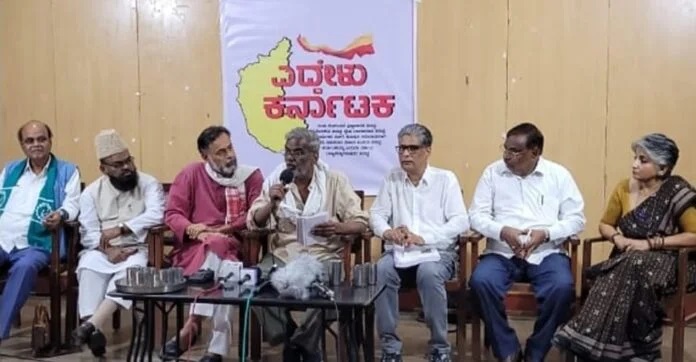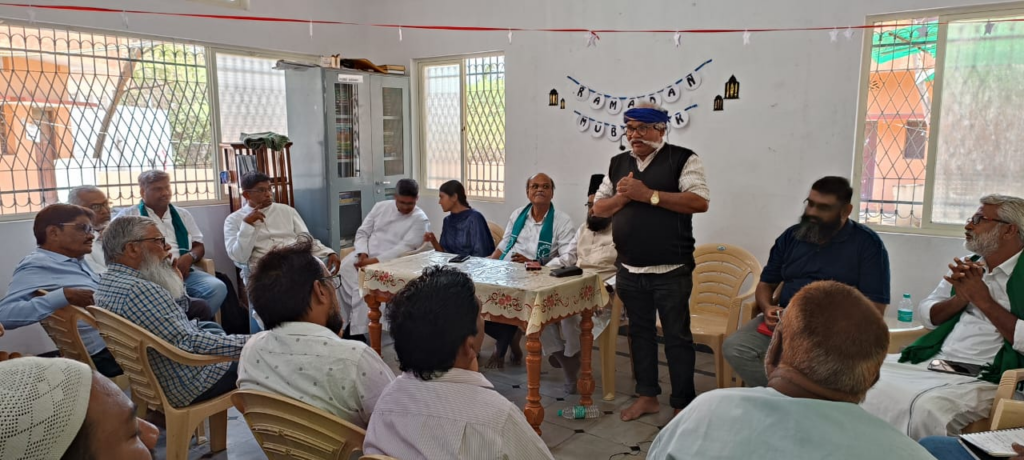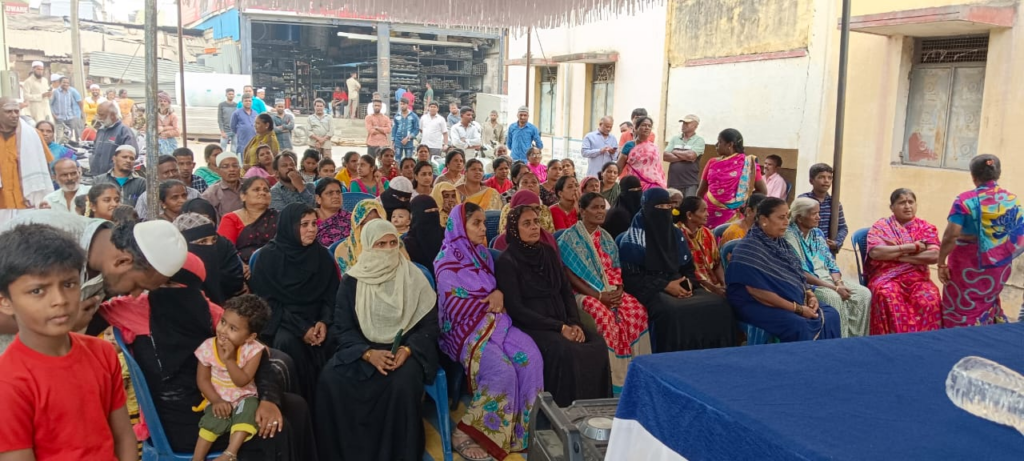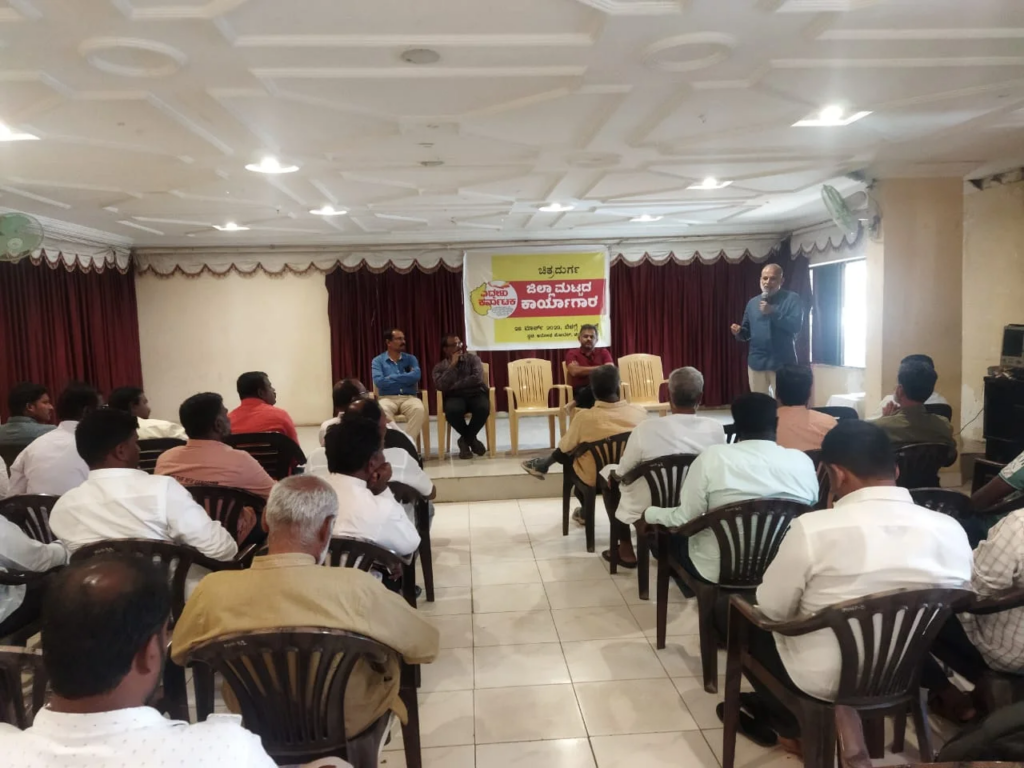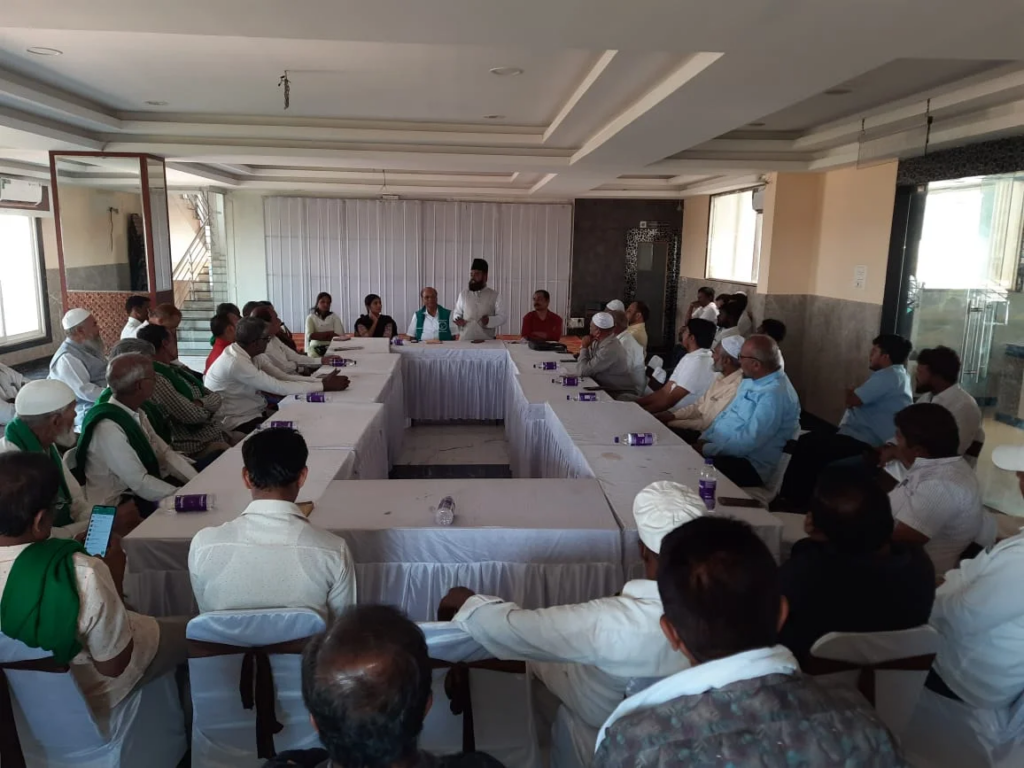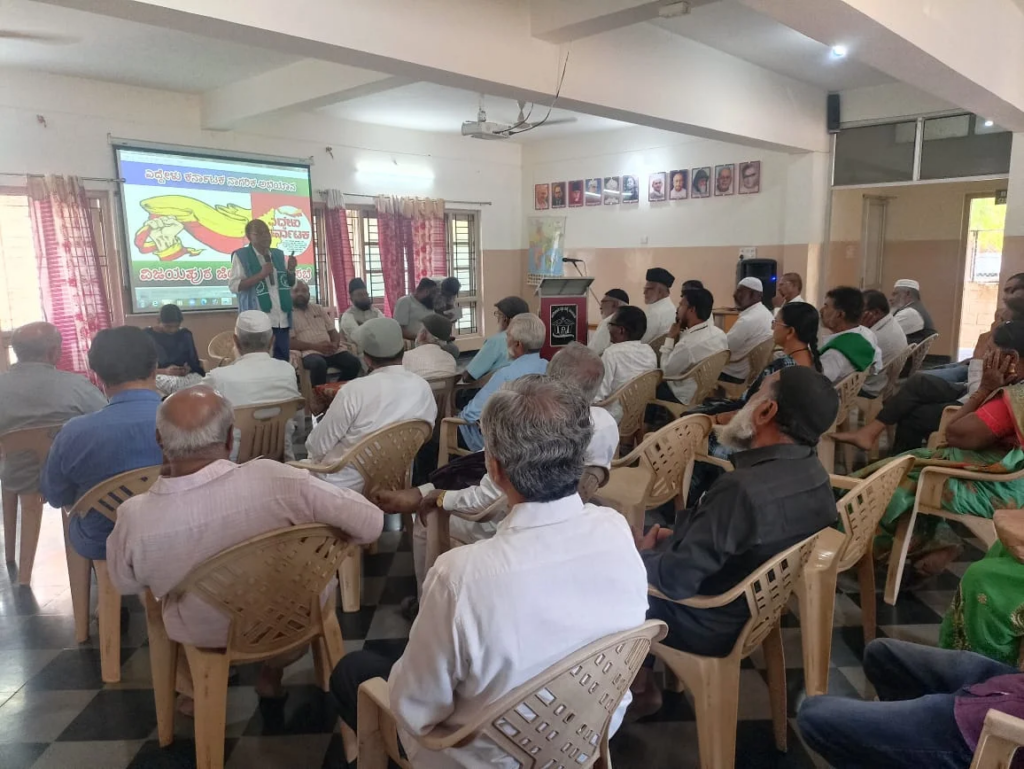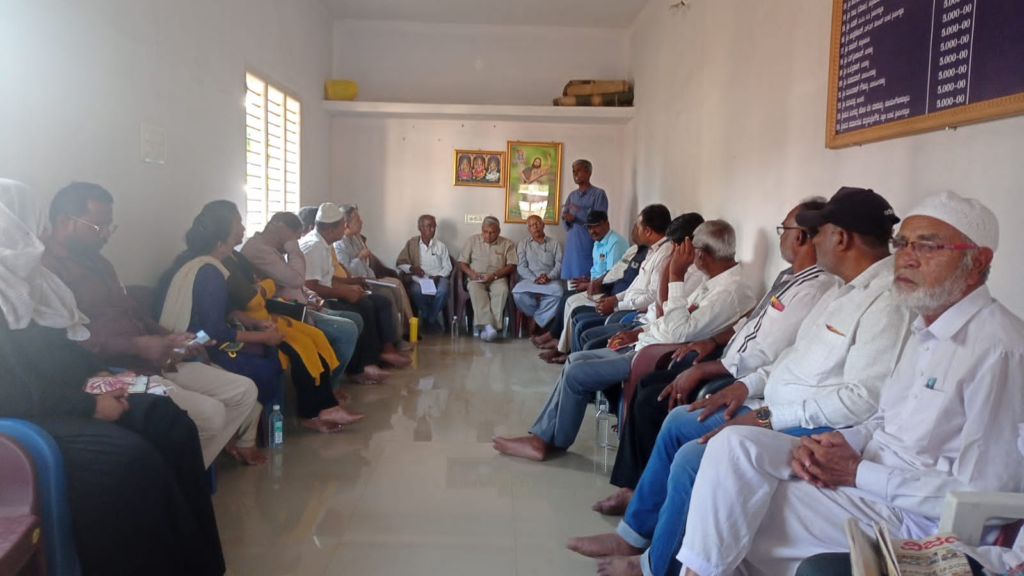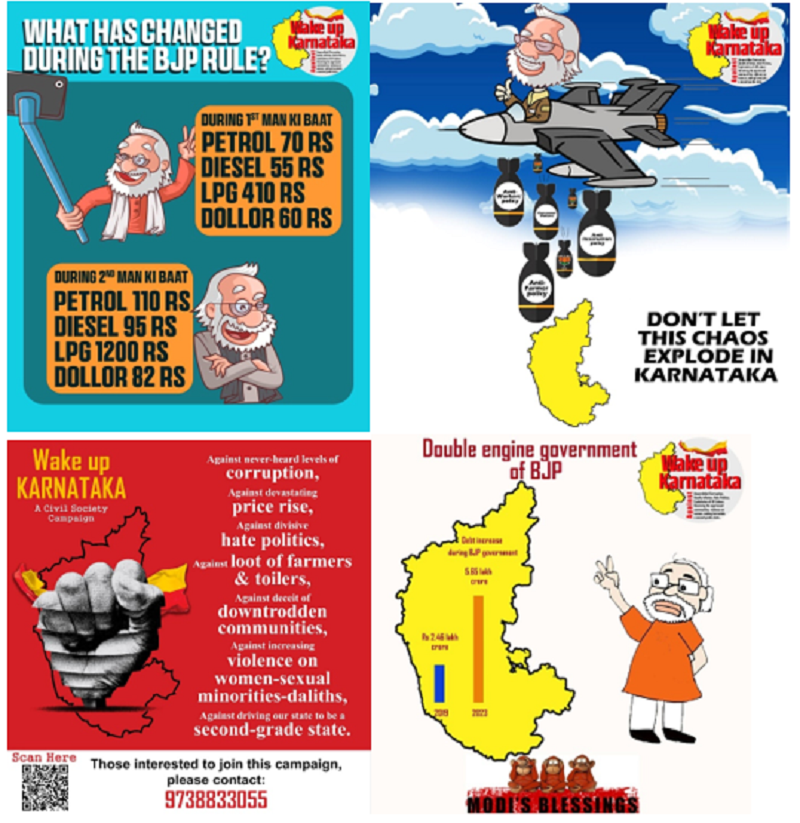As mentioned in the previous part, over the past two decades, concerned individuals who felt that their efforts were insufficient actively engaged in intervening in Karnataka elections, ultimately giving rise to a novel concept. This idea was not the product of any individual or organisation; rather, it emerged as a result of collective thinking nurtured through the experimental school of people’s movements on the ground in Karnataka. The concept took shape during a central workshop convened at Jai Bheem Bhavan on March 5, 2023, where even the name “Eddelu Karnataka” was democratically chosen to encapsulate its essence.
Call of the Consciousness: Embracing the concept nurtured by people’s movements, notable individuals such as Devanur Mahadeva, Purushottama Bilimale, Rahmat Tarikere, Allama Prabhu Bettadur, and Dr. Vijaya, along with D. Saraswati, Tara Rao, A.R. Vasavi, and 16 other distinguished individuals, embraced the concept developed by people’s movements. On March 9, they unitedly appealed to the people of the nation, particularly the youth, to “step forward and actively contribute to the preservation of Karnataka.” All social activists Karnataka responded with incredible fervour, akin to the sprouting of lush greenery when a raindrop rejuvenates a parched land.
A surge of activity ensued: Thousands of individuals registered online, phone lines were inundated with calls, and 250 workshops were conducted throughout the state within a span of 40 days. These workshops covered various zones, districts, and constituencies, engaging diverse community-based groups and factions within them.
Dedicated Group of Volunteers: A minimum of 5,000 volunteers actively commenced their efforts under the banner of Eddelu Karnataka, while an additional 20,000 volunteers from various organisations or community groups within different communities joined the cause. Comrades and friends of associated organizations from Andhra, Telangana, Tamilnadu, Kerala, Maharashtra, Orissa and many more states participated in the campaign enthusiastically adding further wider colour and merit to it. However, there were challenges in effectively reaching and engaging 3,000 individuals who registered online.
Identification of Key Constituencies: A comprehensive analysis of the historical context and present state of all assembly constituencies in the state was conducted, followed by extensive consultations. Through this process, 103 critical constituencies were identified as being at risk. Taking into account our available resources, we initially planned to focus on 55 areas. However, as the work commenced, it gradually expanded to encompass all 103 constituencies. In several locations, larger teams were established, while in others, specialized teams were formed to engage specific communities. Additionally, there were smaller teams that played a minimal but valuable role in supporting the overall campaign efforts.
Comprehensive Field Manual: A detailed field manual was developed to provide guidance to the teams on effective fieldwork strategies. The teams underwent comprehensive training in various aspects, including the identification of crucial polling booths in critical areas, recognising target communities within those booths, establishing contact with community leaders, and initiating conversations by attentively listening to their concerns and perspectives. The manual also outlined a systematic approach for studying the voting patterns of each booth, enabling a deeper understanding of the local dynamics.
Diverse range of literature in large quantities: In support of the campaign, a comprehensive range of literature, totaling10 lakh copies, was produced. In addition to a pamphlet outlining the stance of Eddelu Karnataka, various specific literatures were created for farmers, minorities, student youth, workers, the Dalit community, and the middle class. An informative booklet titled “Disillusioned Promises” was published in both Kannada and English to expose the mismanagement of the BJP. This segment swiftly gained popularity among all activists, serving as a practical guide and a concise summary of the glaring failures in BJP’s governance.
Impactful Social Media Engagement: The social media team left a lasting impression on our audience. They created over a thousand eye-catching posters in five languages—Kannada, English, Urdu, Tulu, and Konkani—under different community-specific names, contributing to a diverse online presence. Additionally, they produced 80 engaging videos that resonated with the audience. The team’s creative efforts extended to the production of eight popular song albums that deeply touched the hearts of the people, generating significant popularity and interest. No exaggeration is needed here. Content writers, designers, video editors, camera operators, editors, and more than a hundred individuals dedicated themselves to this mission, working tirelessly day and night. Numerous social media activists joined and eagerly asked, “How can we contribute?” Unfortunately, we couldn’t actively engage everyone, but we deeply appreciate the immense efforts of individuals like Purushottama Bilimale, K.P. Suresh and activists Mamata, Bhuvan, Pavitra, Dipu and others, whose hard work was truly extraordinary and deserves recognition.
The ‘narrative team’ took on the challenge of countering the BJP’s strategy by collaborating with allies across various media platforms. Their efforts were significant in popularizing the concept of a 40% government and using the metaphor of a gas cylinder to highlight the issue of rising prices, which became a regular topic of discussion. They skilfully presented the hidden agenda behind hate politics in a manner that made large sections of people relate to them. Their work involved in making concocted figures like Urigowda-Nanje Gowda fade away, bringing the Nandini issue to the forefront, questioning Modi’s visit, and exposing the central government’s betrayal of Karnataka etc. These efforts yielded results. The contributions of new-generation media outlets such as Eedina, Peepul TV, Vartha Bharati, Naanu gauri, Gauri lankesh news and such others deserve recognition in this regard.
The Pulse-Raising Survey by ‘Eedina’: In this critical period, where the mainstream media is distorting public sentiment, we felt the need to assess the true pulse of the people through our own method.
Rising to this challenge, ‘Eedina’ undertook the task and sought assistance from the reputable research institute, Cicero. Following their scientific model was no small feat. The objective was to interview and gather opinions from 50,000 selected individuals across 224 different fields, employing a rigorous selection process. The field team of ‘Eedina’ courageously embraced this challenge, with the support of dedicated volunteers from Eddelu Karnataka.
The task at hand was demanding, and the volunteers were fatigued, as this kind of work was no easy undertaking. Undeterred by challenges, the field team of ‘Eedina’ persevered tirelessly. Even after completing their assigned constituencies, they ventured into unfinished ones, ensuring that the survey work was thoroughly accomplished.
They collected data from a remarkable 41,000 families, presenting an honest and realistic picture. The survey conducted by ‘Eedina’ provided invaluable insights into the mindset of diverse communities. Not only did it accurately predict the potential defeat of the BJP, but it also estimated the margin of victory with remarkable precision. The Eedina / ‘Today’ field coordinators, media volunteers, and hand-picked Eddelu Volunteers of Karnataka demonstrated unwavering commitment. A special tribute goes to the astute political thinker and survey expert, Prof. Yogendra Yadav, whose timely guidance proved invaluable.
United oppressed communities: Rising Together to Defeat the BJP beyond Karnataka, a movement began with the collective efforts of diverse people’s organisations, literary thinkers, and communities. While challenges in coordinating the various platforms launched by populist organizations persisted, anxious communities embraced the cause with immense enthusiasm. Broad alliances were formed as Muslims, Christians, and backward classes joined hands with Eddelu Karnataka. It is from this amalgamation that the true grassroots energy was harnessed. Empowered by their direct and extensive influence, the marginalised communities wholeheartedly embraced this campaign.
Bringing real issues to the forefront: Dedicated efforts were made to raise awareness about the challenges faced by specific sections of the society. The Land and shelter Struggle Committee played a crucial role in conducting extensive campaigns and organizing multiple rounds of protests across nine districts.
Their resounding message was, “We will not sacrifice our land for votes.”
Eddelu Karnataka actively collaborated with the Samyukta Kisan Panchayat held at Gandhi Bhavan, aiming to amplify the voices of farmers. Not only did they invite major political parties to address the demands of the farming community, but they also emphasized the need to teach the anti-farmer BJP a lesson. Additionally, allies of the ‘Rural Laborers’ Association’ took on the task of defeating the BJP, which has been undermining the NREGA scheme, by conducting a door-to-door campaign. An extensive initiative was launched to expose the BJP’s deceptive stance on internal reservations and the betrayals it has committed. Labour Rights Day was celebrated on May Day, with a resounding call to defeat the anti-labor BJP.
Advocating a People’s Manifesto: Deliberations took place with the Manifesto Preparation Committees of the Congress and JDS parties regarding the demands put forth by people’s movements. Emphasis was placed on incorporating additional commitments in their respective manifestos to address the aspirations of the people.
Eddelu Karnataka: A Dynamic Collective
Considering all these aspects collectively, Eddelu Karnataka emerged as a united network comprising thousands of volunteers, a narrative team, media organizations, a formidable social media presence, extensive literature, and a diverse range of grassroots communities and oppressed individuals. This coalition was established within a remarkably short span of time.
Persuading Candidates to Withdraw: Through extensive discussions with candidates from various political parties, particularly those with their backgrounds in minority, left, farmer, and Dalit communities, efforts were made to convince them to withdraw from the electoral race. As a result, 49 candidates heeded our appeal and stepped aside. It is essential to acknowledge and salute these parties and candidates who responded to our plea, as their contribution holds significant importance alongside the achievements of Eddelu Karnataka. (While their names are not mentioned here, the intention is to recognise and honour them individually.)
Three Key Voting Strategies: In each critical constituency, specific communities and regions were carefully identified, and targeted campaigns were carried out. Extensive efforts were made to convince the leaders of these communities or regions about the political responsibility at hand. Through their influence, the three fundamental voting strategies were effectively disseminated to the people within their respective areas. These strategies emphasized the importance of increasing the overall vote count, avoiding vote division, and supporting the candidate with the best chance of defeating the BJP candidate. These three principles not only provided clarity on the necessary actions but also helped alleviate internal divisions. The “Vote for the candidate who can defeat” strategy worked remarkably well, almost like magic.
Special Initiative to Resolve Confusion: In certain constituencies, there was confusion between Congress and JD(S) candidates regarding who had a better chance of winning. To address this, dedicated teams were dispatched to assess the situation and facilitate consensus-building. Eddelu Karnataka, along with community leaders, collaborated to reach a conclusive decision on the candidate with a higher probability of victory in these constituencies, providing a clear message to the public. Upon reviewing our decisions after the elections, it was discovered that our calculations were incorrect in only three areas. Efforts were made to rectify these decisions and ensure that the correct information reached people across all regions. It is worth acknowledging that these endeavors effectively mobilized resistance votes. However, despite these efforts, internal divisions within certain parties could not be completely resolved, resulting in our loss in Chikpet, Dasarahalli in Bangalore and Harihar, Raichur, and Bijapur districts.
In summary:
Three significant social forces united in this campaign to gain momentum.
- Numerous dedicated organisations in Karnataka were actively advocating for the genuine concerns of the people.
- Grassroots institutions, which have been influenced by both community and humanitarian ideologies.
- Intellectuals and writers who have been voicing the importance of Karnataka’s identity and the essence of democracy.
In collaboration they focused on three distinct areas of action:
- Targeting 103 high-risk regions, they rallied and equipped thousands of volunteers to actively engage in grassroots efforts.
- Harnessing the power of the cyber realm, they spearheaded a digital revolution through social media platforms and media channels, employing compelling literature, counter-narratives, and comprehensive surveys.
- By engaging in political dialogues with parties, candidates, and community leaders, they successfully mitigated the divisive nature of electoral races, fostering unity and co-operation among diverse groups.
The people were consistently reminded of the four major aspects of BJP misrule:
- Exposing the rampant corruption that went unnoticed under BJP’s governance, symbolized by the metaphor of “40%.”
- Highlighting the detrimental impact of rising prices, captured through the metaphor of the gas cylinder, reflecting BJP’s slogan.
- Shedding light on the anti-people, pro-corporate policies implemented by the BJP, represented metaphorically by Nandini and Krishi policies.
- Unmasking the politics of hatred propagated by the BJP, debunking the false history of Uri Gowda-Nanje Gowda.
The three fundamental principles of voting are:
- Increasing the voter turnout of the secular population.
- Ensuring that the secular votes remain unified and not divided.
- Casting the vote for the candidate who has the potential to defeat the BJP, regardless of their party affiliation.
This extraordinary experience has been rather overwhelming with such a diverse range of work accomplished in such a brief period in a collective, unified spirit. The immense joy and invaluable experiences gained from it are immeasurable. The core and most crucial aspect to be emphasised is that this remarkable achievement is the result of collective efforts from the people of this region. Every aspect of this endeavour involved the sweat, dreams, time, money and unwavering dedication of thousands of individuals who strive for the betterment of society. The inherent pro-democratic and pro-people spirit that lay dormant within the soil of Karnataka has emerged in full force. We must pay the utmost respect to this indomitable spirit of this land.
(In Part-3 – Impact of Wake Up Karnataka, Lessons Learnt )
Also Read
Eddelu Karnataka, understanding a unique civil society experiment: K’taka assembly polls
Related
Vote Share Percentage, Politics, Propaganda or Mathematics: Karnataka 2023
What Karnataka thinks today, will India think tomorrow?
Social media campaigns seeking accountability gain traction ahead of Karnataka assembly elections
